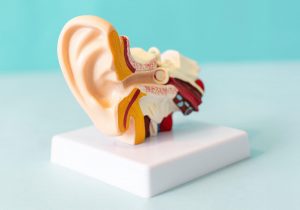
What is tinnitus?
If you’ve noticed a ringing, dinging, humming, hissing or buzzing noise in your ears but no sound is there, you need to hear about tinnitus. Luckily, the noise in your head isn’t all in your head. It’s a common condition known as tinnitus, which is when your ears are filled with the perception of sound without any source. It can be a mystery and a misery, but you don’t have to suffer in silence. Hear all about tinnitus and its prevalence, along with your risk and the symptoms you can’t ignore. Then listen to the tinnitus treatment options to help you enjoy the sound of silence again.
An earful about tinnitus
An irritating ringing, whizzing, or whooshing sound in your ears that makes it hard to hear and focus is more than just annoying. It’s an audiological and neurological condition called tinnitus that creates a persistent ringing or similar sound in your ears that only you can hear. There are two types of tinnitus that differ based on whether others can hear the sounds. In subjective tinnitus, which makes up 99% of the cases, only you can hear the ringing or rumbling in your ears. But with objective tinnitus, which only occurs very, very rarely, others can hear the noises because they’re often the result of the body’s internal functions. The causes of tinnitus aren’t clear, but most people tormented by tinnitus typically have one or more of the following:
- Age-related or noise-induced hearing loss
- Prolonged exposure to very loud noise
- Damage to the nerves in the inner ear
- Ear injuries
- Sinus or ear infections
- Earwax buildup
- Head or neck injury
- High or low blood pressure
The frequency of tinnitus
Tinnitus is shockingly common—with approximately 10 to 25% of adults in the United States dealing with the noise—but that doesn’t make it any less aggravating. Along with the millions of American adults with tinnitus, children can have it, too. The sounds may decrease or disappear over time, but they typically only get worse without treatment.
Your risk for the ringing
Have you heard that tinnitus can be experienced by anyone at any age? This rings true, but certain risk factors make you more susceptible to hearing these sounds, including:
- Regular exposure to loud noises from noisy environments, including heavy equipment, portable music players, or chain saws
- Aging
- Gender, with men more likely to suffer than women
- Heavy alcohol use
- Smoking and tobacco use
- Health conditions, such as cardiovascular problems, high blood pressure, obesity or head injuries
Get a sense of the symptoms
The sounds and symptoms of tinnitus aren’t the same for every sufferer, but the one thing they have in common is the frustration that they cause. If you have tinnitus, you may hear ringing, buzzing, or screeching sounds, or possibly notice roaring, clicking, or clapping tones. Or you may detect humming, hissing, whirring, or whooshing noises. These sounds can be so low and subtle that you barely notice them at all, or they can be high-pitched, loud, and so disruptive that they interfere with your daily life. And you may only hear these noises in one ear, or in both. If you notice any sounds in your ears that no one else can hear, consider contacting your SignatureMD-affiliated doctor to check your ears and your hearing.
Listen to your tinnitus treatment options
While there’s no cure for tinnitus, the symptoms and sounds can be treated to help you quiet the noise. But the treatment depends on the cause of your case, as well as your health and the severity of the symptoms. If your tinnitus is the result of an underlying health condition, some of the treatments that may be prescribed include:
- Wearing a hearing aid to address any hearing loss.
- Using a noise machine or sound generator to mask the noises.
- Taking medications to ease the underlying health conditions or improve your sleep.
- Seeking cognitive behavioral therapy to help improve your quality of life.
- Getting tinnitus retraining therapy so you don’t notice your tinnitus symptoms.
- Having dental treatment to realign your bite if your tinnitus is caused by TMJ.
By listening to these insights and taking this sound advice, you’ll be able to turn down the volume on tinnitus.
Sources:
- https://www.nidcd.nih.gov/health/tinnitus
- https://www.ata.org/about-tinnitus/
- https://www.hopkinsmedicine.org/health/conditions-and-diseases/tinnitus
About SignatureMD
SignatureMD is one of the nation’s largest firms providing initial conversion and ongoing support services to concierge medicine physicians. SignatureMD currently partners with over 200 affiliated primary care physicians and specialists across 35 states, and its network is rapidly expanding.